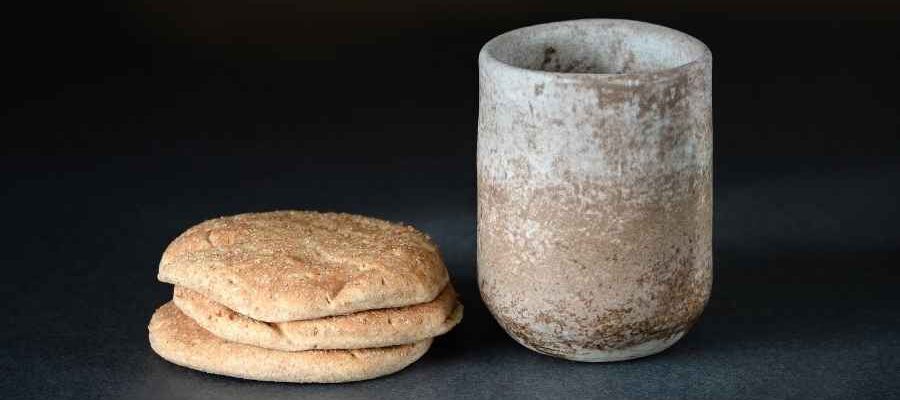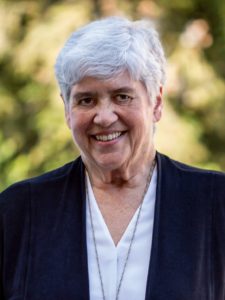
Holy Thursday Gospel Reflection
Thursday, April 1, 2021
by Sister Barbara Thiella, SNDdeN
Hear Me: Do What I Do and Remember Me
Come, let us walk together into a supper room and observe Jesus and his closest companions reclining at a table. As twilight disappears, it is Passover. Celebrating this feast every year, the participants bring a lifetime of memories to the evening gathering. Since Jesus has little time left in his life, his words and actions lay open his heart for his friends. The weight of moment communicates his tender love and transparent legacy for his followers.
Let us look back to the foundation of Jesus’ legacy of love: at the start of his public life Jesus heard Yahweh call him “the Beloved Son worth listening to.” Over the next couple of years, he develops how this personal call is good news for him and for his hearers. Now, the ending of his life prompts Jesus to state again that Yahweh has never failed him as an ever-present lover, guide and protector. This night, before Jesus first takes up the third cup of blessing and offers it as his blood or next takes, blesses, breaks and gives bread as his body, he gets up and washes the feet of his friends. Words and gestures coalesce: Lord and servant, death and life, fullness and emptiness embrace. Yahweh has remained constant in all the moments of Jesus’ life, whether joyful or bitter, every day or profound. While Jesus is the Lord and teacher of his followers, he also is their servant. Thus, when he later asks that his followers to take up his message and spread it, encouraged by the Spirit they will have the courage to extend Jesus’ personal understanding of Yahweh.
I am struck by how the good news from Jesus is remembered in the early church. She recalls how the ordinary actions of eating and cleansing are occasions for Jesus to pass on his love and experience: Jesus promises to be with his followers to the end, just as he knows that Yahweh will remain with him after this celebratory meal. The evening supper goes to the heart of giving thanks for Yahweh’s presence not only after the Passover exodus from Egypt but also from the Jesus’ journey on the cross to his empty tomb. This night Yahweh will travel again with Jesus and his people. He remains the faithful lover, guide and protector of Jesus and those he brings along – even us – to the very end. So, let us walk away from the supper and remember to link thanksgiving with service, strength with vulnerability.
Consider these questions: in the Holy Thursday liturgies, which words move you about Yahweh’s faithful love for Jesus? For you? And, whose feet are you washing these days?
Remember, O Church,
Our blessing cup is communion with the blood of Christ.
Nourishment for us as servants for others
who become Jesus’ visible presence
all the days of our lives.
John 13:1-15
Before the feast of Passover, Jesus knew that his hour had come to pass from this world to the Father. He loved his own in the world and he loved them to the end. The devil had already induced Judas, son of Simon the Iscariot, to hand him over. So, during supper, fully aware that the Father had put everything into his power and that he had come from God and was returning to God, he rose from supper and took off his outer garments.
He took a towel and tied it around his waist. Then he poured water into a basin and began to wash the disciples’ feet and dry them with the towel around his waist. He came to Simon Peter, who said to him, “Master, are you going to wash my feet?” Jesus answered and said to him, “What I am doing, you do not understand now, but you will understand later.” Peter said to him, “You will never wash my feet.” Jesus answered him, “Unless I wash you, you will have no inheritance with me.” Simon Peter said to him, “Master, then not only my feet, but my hands and head as well.” Jesus said to him, “Whoever has bathed has no need except to have his feet washed, for he is clean all over; so you are clean, but not all.” For he knew who would betray him; for this reason, he said, “Not all of you are clean.”
So when he had washed their feet and put his garments back on and reclined at table again, he said to them, “Do you realize what I have done for you? You call me ‘teacher’ and ‘master,’ and rightly so, for indeed I am. If I, therefore, the master and teacher, have washed your feet, you ought to wash one another’s feet. I have given you a model to follow, so that as I have done for you, you should also do.”
The Gospel of the Lord.
Meet Sister Barbara Thiella, SNDdeN
 Sr. Barbara Thiella, SNDdeN, daughter of John D. and Edna F. Dutcher Thiella, was born in San Francisco, California, on April 26, 1939. She was the first of two children. Her brother John is an attorney. Barbara entered the California Province of the Sisters of Notre Dame de Namur in 1957, receiving the name Sr. Andrea. She attended Notre Dame de Namur University in Belmont, earning a degree in liberal arts and a California teaching credential. Then, she studied at the University of San Francisco and obtained a graduate degree in theology and a California credential in school administration. Later, she received a credential from the State of Hawaii. Sister Barbara has spent half of her years of ministry in formal education and the other half in leadership roles for the Sisters of Notre Dame de Namur and the Catholic Church at the diocesan level. Within Notre Dame schools, Sister Barbara has served as a teacher and administrator in the Dioceses of San Francisco, Monterey, Sacramento and Honolulu. She also worked at the University of the Pacific, Stockton, as a Campus Minister. As Vice Chancellor in the Diocese of Oakland, Sister Barbara facilitated the Second Pastoral Convocation and the ensuing Diocesan Pastoral Council. The California Province of the Sisters of Notre Dame called her first to direct personnel planning and then to be a member of the California Leadership team. Since 2000, Sister Barbara has been Chancellor in the Diocese of Stockton with a particular care for diocesan ministries that offer resources and training to 34 parishes and 12 missions. Sister Barbara has used her training and skills in pastoral theology and administration, research and development, in service to the Sisters of Notre Dame de Namur, dioceses in the Northern California Province, other religious communities, schools and seminaries. As a woman of the Church, Sister Barbara offers her life to affirm goodness in persons and institutions and to build together with others towards an inclusive community. As a Sister of Notre Dame, she cherishes the gospel call to seek for goodness in all aspects of life. The communal dedication of the Sisters of Notre Dame challenges and strengthens her own following of Jesus Christ.
Sr. Barbara Thiella, SNDdeN, daughter of John D. and Edna F. Dutcher Thiella, was born in San Francisco, California, on April 26, 1939. She was the first of two children. Her brother John is an attorney. Barbara entered the California Province of the Sisters of Notre Dame de Namur in 1957, receiving the name Sr. Andrea. She attended Notre Dame de Namur University in Belmont, earning a degree in liberal arts and a California teaching credential. Then, she studied at the University of San Francisco and obtained a graduate degree in theology and a California credential in school administration. Later, she received a credential from the State of Hawaii. Sister Barbara has spent half of her years of ministry in formal education and the other half in leadership roles for the Sisters of Notre Dame de Namur and the Catholic Church at the diocesan level. Within Notre Dame schools, Sister Barbara has served as a teacher and administrator in the Dioceses of San Francisco, Monterey, Sacramento and Honolulu. She also worked at the University of the Pacific, Stockton, as a Campus Minister. As Vice Chancellor in the Diocese of Oakland, Sister Barbara facilitated the Second Pastoral Convocation and the ensuing Diocesan Pastoral Council. The California Province of the Sisters of Notre Dame called her first to direct personnel planning and then to be a member of the California Leadership team. Since 2000, Sister Barbara has been Chancellor in the Diocese of Stockton with a particular care for diocesan ministries that offer resources and training to 34 parishes and 12 missions. Sister Barbara has used her training and skills in pastoral theology and administration, research and development, in service to the Sisters of Notre Dame de Namur, dioceses in the Northern California Province, other religious communities, schools and seminaries. As a woman of the Church, Sister Barbara offers her life to affirm goodness in persons and institutions and to build together with others towards an inclusive community. As a Sister of Notre Dame, she cherishes the gospel call to seek for goodness in all aspects of life. The communal dedication of the Sisters of Notre Dame challenges and strengthens her own following of Jesus Christ.
